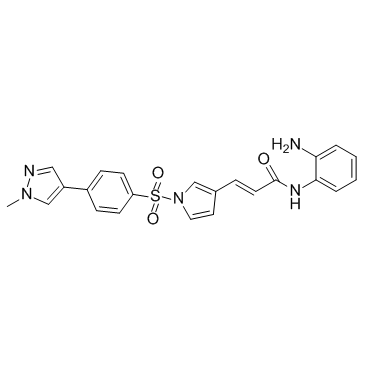Domatinostat |
| Katalog-Nr.GC35893 |
Domatinostat (freie Base von 4SC-202) ist ein selektiver HDAC-Inhibitor der Klasse I mit IC50-Werten von 1,20 μM, 1,12 μM und 0,57 μM fÜr HDAC1, HDAC2 bzw. HDAC3. Es zeigt auch eine hemmende AktivitÄt gegen Lysin-spezifische Demethylase 1 (LSD1).
Products are for research use only. Not for human use. We do not sell to patients.

Cas No.: 910462-43-0
Sample solution is provided at 25 µL, 10mM.
Domatinostat (4SC-202 free base) is a selective class I HDAC inhibitor with IC50 of 1.20 μM, 1.12 μM, and 0.57 μM for HDAC1, HDAC2, and HDAC3, respectively. It also displays inhibitory activity against Lysine specific demethylase 1 (LSD1). HDAC-3|0.57 μM (IC50)|HDAC-2|1.12 μM (IC50)|HDAC-1|1.2 μM (IC50)|HDAC-11|9.7 μM (IC50)|HDAC-5|11.3 μM (IC50)|HDAC-10|21 μM (IC50)|HDAC-9|50 μM (IC50)
Domatinostat (4SC-202 free base) tosylate significantly reduces proliferation of all epithelial and mesenchymal UC cell lines (IC50 0.15-0.51 μM), inhibits clonogenic growth and induces caspase activity[1]. Domatinostat (4SC-202 free base) tosylate provokes apoptosis activation in CRC cells, while caspase inhibitors (z-VAD-CHO and z-DVED-CHO) significantly alleviate Domatinostat (4SC-202 free base) tosylate-exerted cytotoxicity in CRC cells. Meanwhile, Domatinostat (4SC-202 free base) tosylate induces dramatic G2-M arrest in CRC cells. Further studies show that AKT activation might be an important resistance factor of Domatinostat tosylate. Domatinostat (4SC-202 free base) tosylate-induced cytotoxicity is dramatically potentiated with serum starvation, AKT inhibition (by perifosine or MK-2206), or AKT1-shRNA knockdown in CRC cells. On the other hand, exogenous expression of constitutively active AKT1 (CA-AKT1) decreases the sensitivity by Domatinostat tosylate in HT-29 cells. Notably, Domatinostat (4SC-202 free base) tosylate, at a low concentration, enhances oxaliplatin-induced in vitro anti-CRC activity[2]. Domatinostat (4SC-202 free base) tosylate treatment induces potent cytotoxic and proliferation-inhibitory activities against established HCC cell lines (HepG2, HepB3, SMMC-7721) and patient-derived primary HCC cells. Domatinostat (4SC-202 free base) tosylate induces apoptosis signal-regulating kinase 1 (ASK1) activation, causing it translocation to mitochondria and physical association with Cyp-D[3].
Oral gavage of Domatinostat (4SC-202 free base) inhibits HT-29 xenograft growth in nude mice, and when combined with oxaliplatin, its activity is further strengthened[2].
[1]. Pinkerneil M, et al. Evaluation of the Therapeutic Potential of the Novel Isotype Specific HDAC Inhibitor 4SC-202 in Urothelial Carcinoma Cell Lines. Target Oncol. 2016 Dec;11(6):783-798. [2]. Zhijun H, et al. Pre-clinical characterization of 4SC-202, a novel class I HDAC inhibitor, against colorectal cancer cells. Tumour Biol. 2016 Aug;37(8):10257-67. [3]. Fu M, et al. 4SC-202 activates ASK1-dependent mitochondrial apoptosis pathway to inhibit hepatocellular carcinoma cells. Biochem Biophys Res Commun. 2016 Mar 4;471(2):267-73 [4]. S.W.Henning, et al. Preclinical characterization of 4SC-202, a noval isotype specific HDAC inhibitor.
Average Rating: 5 (Based on Reviews and 36 reference(s) in Google Scholar.)
GLPBIO products are for RESEARCH USE ONLY. Please make sure your review or question is research based.
Required fields are marked with *




















